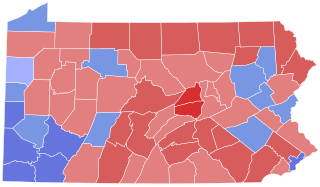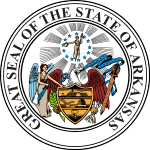
Dale Leon Bumpers was an American lawyer and politician who served as the 38th Governor of Arkansas (1971–1975) and in the United States Senate (1975–1999). He was a member of the Democratic Party. He was counsel at the Washington office of law firm Arent Fox LLP, where his clients included Riceland Foods and the University of Arkansas for Medical Sciences.

The 1998 United States Senate elections were held on November 3, 1998, with the 34 seats of Class 3 contested in regular elections. This was seen as an even contest between the Republican Party and Democratic Party. While the Democrats had to defend more seats up for election, Republican attacks on the morality of President Bill Clinton failed to connect with voters and anticipated Republican gains did not materialize. The Republicans picked open seats up in Ohio and Kentucky and narrowly defeated Democratic incumbent Carol Moseley Braun, but these were cancelled out by the Democrats' gain of an open seat in Indiana and defeats of Republican Senators Al D'Amato and Lauch Faircloth. The balance of the Senate remained unchanged at 55–45 in favor of the Republicans.

The 1996 United States Senate elections were held on November 5, 1996, with the 33 seats of Class 2 contested in regular elections. Special elections were also held to fill vacancies. They coincided with the presidential election of the same year, in which Democrat Bill Clinton was re-elected president.

The 1992 United States Senate elections, held November 3, 1992, were elections for the United States Senate. The 34 seats of Class 3 were contested in regular elections, along with special elections to fill vacancies. They coincided with Bill Clinton's victory in the presidential election. This was the first time since 1956 that the balance of the Senate remained the same.

The 1980 United States Senate elections were held on November 4, coinciding with Ronald Reagan's victory in the presidential election. The 34 Senate seats of Class 3 were contested in regular elections. Reagan's large margin of victory over incumbent Jimmy Carter gave a huge boost to Republican Senate candidates, allowing them to flip 12 Democratic seats and win control of the chamber for the first time since the end of the 83rd Congress in January 1955. This was the first time since 1966 that any party successfully defended all their own seats.

The 1978 United States Senate elections were held on November 7, in the middle of Democratic President Jimmy Carter's term. The 33 seats of Class 2 were contested in regular elections. Special elections were also held to fill vacancies.

The 1974 United States Senate elections were held on November 5, with the 34 seats of Class 3 contested in regular elections. They occurred in the wake of the Watergate scandal, Richard M. Nixon's resignation from the presidency, and Gerald Ford's subsequent pardon of Nixon. Economic issues, specifically inflation and stagnation, were also a factor that contributed to Republican losses. As an immediate result of the November 1974 elections, Democrats made a net gain of three seats from the Republicans, as they defeated Republican incumbents in Colorado and Kentucky and picked up open seats in Florida and Vermont, while Republicans won the open seat in Nevada. Following the elections, at the beginning of the 94th U.S. Congress, the Democratic caucus controlled 60 seats, and the Republican caucus controlled 38 seats.

The 1968 United States Senate elections were elections for the United States Senate. Held on November 5, the 34 seats of Class 3 were contested in regular elections. They coincided with the presidential election of the same year. The Republicans picked up five net seats in the Senate. This saw Republicans win a Senate seat in Florida for the first time since Reconstruction.

The 1964 United States Senate elections were held on November 3. The 33 seats of Class 1 were contested in regular elections. Special elections were also held to fill vacancies. They coincided with the election of President Lyndon B. Johnson by an overwhelming majority, to a full term. His Democratic Party picked up a net two seats from the Republicans. As of 2023, this was the last time either party has had a two-thirds majority in the Senate, which allowed the Senate Democrats to override a veto, propose constitutional amendments, or convict and expel certain officials without any votes from Senate Republicans. However, internal divisions would have prevented the Democrats from having done so. The Senate election cycle coincided with Democratic gains in the House in the same year.

The United States Senate election of 1978 in Massachusetts was held on November 7, 1978, with the incumbent Republican Senator Edward Brooke being defeated by Democratic Congressman Paul Tsongas.

The Democratic Party of Arkansas is the affiliate of the Democratic Party in the state of Arkansas. The current party chair is Grant Tennille. Former U.S. president Bill Clinton was born in Arkansas, and served as state governor from 1979 to 1981 and 1983 to 1992.

The 1978 Arkansas gubernatorial election, held on November 7, was the first time that future president Bill Clinton was elected Governor of Arkansas.
Bill Clinton served as the 42nd president of the United States (1993–2001) and as the 40th and 42nd governor of Arkansas. A member of the Democratic Party, Clinton first ran for a public office in 1974, competing in the congressional election for Arkansas's 3rd congressional district. After narrowly losing to incumbent representative John Paul Hammerschmidt, he ran for the office of Arkansas Attorney General in 1976. He won the Democratic primary comfortably, receiving over 55% of the popular vote. Witnessing his strong support during the primaries, Republicans did not nominate a candidate to run against him. Clinton won the general election unopposed. His experience as the attorney general was considered a natural "stepping-stone" to the governorship.

The 1980 United States Senate election in Georgia was held on November 4, 1980. Incumbent Democratic U.S. Senator and former Governor of Georgia Herman Talmadge ran for reelection to a fifth term, but lost narrowly to Mack Mattingly, Chairman of the Georgia Republican Party.

The 1978 United States Senate election in Maine was held on November 7, 1978. Incumbent Democratic U.S. Senator William Hathaway ran for re-election to a second term, but was defeated by William Cohen, the Republican U.S. Representative from Maine's 2nd congressional district. This is the last time a Senator from Maine lost re-election.

The 1992 United States Senate election in Arkansas was held on November 3, 1992. Incumbent Democratic Senator Dale Bumpers won re-election to a fourth term. His Republican opponent was future Arkansas lieutenant governor, governor, and two-time presidential candidate Mike Huckabee, a church pastor from Texarkana.

The 1962 United States Senate election in Pennsylvania was held on November 6, 1962. Incumbent Democratic U.S. Senator Joseph S. Clark, Jr. successfully sought re-election to another term, defeating Republican nominee James E. Van Zandt.

The 2014 United States House of Representatives elections in Arkansas was held on Tuesday, November 4, 2014, to elect the four U.S. representatives from the state of Arkansas, one from each of the state's four congressional districts. The elections coincided with the elections of other federal and state offices, including the governor of Arkansas and a United States senator.

The 1988 United States presidential election in Arkansas took place on November 8, 1988. All fifty states and the District of Columbia, were part of the 1988 United States presidential election. State voters chose six electors to the Electoral College, which selected the president and vice president.

The 1974 United States Senate election in Arkansas took place on November 5, 1974. Incumbent Democratic U.S. Senator J. William Fulbright ran for re-election to a sixth term in office, but was defeated in the Democratic primary by Governor of Arkansas Dale Bumpers. Bumpers won the general election easily.






















